Hawaii beach showers are something so many of us use but may rarely have given much thought to. The effluent from these ubiquitous beach showers goes directly into the ocean together with whatever chemicals it contains. In a newly released study, this now appears to be a severe problem for beaches where showers have constant use.
Hawaii beach showers may be a significant contributor to dangerous pollution.
This is a result of a variety of contaminants found in sunscreens. Those enter the ocean and present a source of damage to the fragile Hawaii reef ecosystem.
According to a study from the Journal of Hazardous Materials (September 2022), “sunscreen contamination was highest at beaches with the highest visitation rates.” Obviously, entering the water at popular beaches with sunscreen on is perhaps the source of even more than environmental damage. But that was not the subject of this study.
Nonetheless, beach showers may be a significant source of chemicals entering the water, especially at the most popular Hawaii beaches, such as Waikiki, Ko’olina, Waimea Bay, Hanalei Bay, Po’ipu, Makena, Wailea, Kapalua, Hapuna, etc.
We think of Hanalei Bay, where we have used the beach showers frequently. There is so much effluent there that it creates a small river heading back to the ocean.
The article suggests that mitigation efforts be implemented to reduce the pollution from the sunscreen entering the water.
Hawaii Beach shower runoff studied.
In 2019, beach shower runoff was investigated on the Big Island, Maui, and Oahu. The water sampled showed a wide range of chemical pollutants from the UV filters in sunscreens.
The two most commonly found chemicals were oxybenzone, often found in high concentrations, and octocrylene, which was found at almost every site. In both cases Waikiki beach showers had the most dangerous levels. Other chemicals found included avobenzone, octinoxate, 4-methylbenzylidene camphor, benzophenone-2, benzophenone-1, 2,2′-dihydroxy-4-methoxybenzophenone, 4-hydroxybenzophenone, and dioxybenzone (DHMB).
Hawaii coral reefs and people: dangerous chemicals from sunscreens.
Researchers reported these same chemicals were, not surprisingly, found in coral reefs adjacent to the showers, and “these chemicals could pose a serious threat to beach zones and coral reef habitats.”
The Canadian Medical Association recently said, “Ultraviolet filters found within chemical sunscreens may be harmful to the environment.” More research is needed because “Emerging evidence suggests that some chemical sunscreen ingredients are systemically absorbed, but the clinical importance of this remains unclear…”
Recommendations for remediation are many.
As of 2021, Hawaii enacted a state law prohibiting the sale of sunscreens containing oxybenzone and octinoxate. These chemicals alone are found in thousands of sunscreens.
That does not mean, however, that visitors don’t still have and use them. It remains to be seen how big an impact the state’s sales ban and and visitor education campaign have made. Future studies may be able to answer this question by using these 2019 levels as a baseline.
Hawaii beach showers are a chemical pollution “point source” to address.
There is concern that the reefs are being damaged by the chemicals present in ways such as a critical inability to reproduce, which could result in reef death. As reefs decline for multiple reasons, including climate change, and pollution such as from beach showers, it is an easy way to mitigate some problems.
The study suggests that the showers violate the Clean Water Act by being a “single identifiable sources of pollution from which pollutants are discharged.”
Things you can do to help.
- Only use reef-safe sunscreens. Physical barrier sunscreens, and not chemical ones.
- Avoid using beach showers that drain into the ocean; wait instead to use showers elsewhere.
- Swim late in the day when sunscreen is not needed.
Little is known about UV ingredients in sunscreen.
More research needs to be done to understand better the global and personal risks associated with the chemicals in sunscreens.
A recent National Academy of Sciences report said, “Sunscreen is used as a critical tool for the prevention of UV skin damage and skin cancer; however, specific UV filter ingredients may also impact the health of aquatic environments, resident species, or ecosystem services.”
Hawaii may seek to act further in this regard.
Maui County is already looking at going further in banning all chemical sunscreens.
Importance of Hawaii coral reefs.
Hawaii coral reefs in our coastal waters provide important shoreline protection and vital habitat for marine life, as well as serving as a location for fishing, snorkeling and other human activities. Coral reefs today are facing many threats, from contamination by human sewage and polluting chemicals from sunscreens and plastics, to other threats such as the depletion of the ozone layer, rising sea levels and temperatures, and the acidification of the ocean itself.
Get Breaking Hawaii Travel News
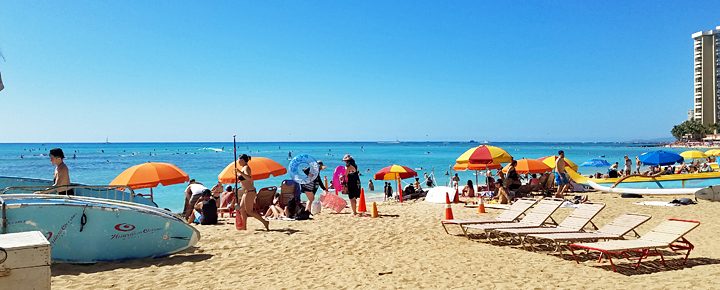
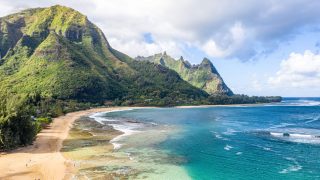

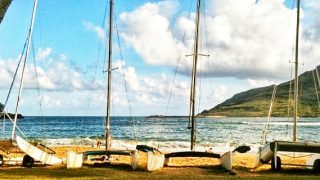
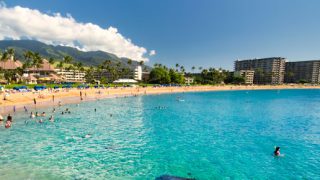

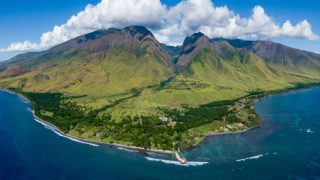
Pull your head out Hawaii, and start with the golf courses, Fertilizers are the real culprit…. quit forcing the purchase of 20 dollar sunscreen and now no beach showers. Lame narrative and now My water bill goes up. The resorts win along with the county…..they will be paying less water bill, and hosing the locals again. Wake Up Hawaii
They need to ban all sunscreen in the world to fix this problem cause visitor bring their own sunscreen from their home.
If you’re really concerned about the coral reef being protected don’t waste your time on the minimum amount of sunscreen that people use on their body you need to look at all of the chemicals that the resorts use, the golf courses use, the agricultural industry uses. They spray Roundup and a number of other pesticides and herbicides that have been banned. This is being sprayed on the land to kill plants and weeds and pests. All this stuff gets washed into the ocean every time it rains, this is what is killing your reef not sunscreen! Stop blaming it on the sunscreen you need to look at where the Lion’s share of the harsh chemicals come from. The lawsuit against Monsanto on Maui is a clear indication of this. Do your research!
All these other commenters are dweebs
Thank heavens for u
Stop tourism’s voracious appetite upon coming here by installing restrictions and laws and regulations because The Hawai’i Tourist Industry over kisses the Tourist so they can dump more money into their corrupt pockets. We all know what they do and they pretend to be secretive about it and that’s why the truth to the matter will never ever be justifiably addressed .
It’s a proven fact that certain sunscreens are killing the coral and Hawaii is doing the right thing to keep them out of the ocean. Shower soap etc needs more research. IF the are bad for coral, that is a big concern because of the huge number of showers taken in all the hotels and homes that dump into the ocean.
I see people washing their hair too, taking a whole shower with shampoo, conditioner, bodywash, like they would at home. That can’t be good either, have yiu ever looked at all the chemicals in those products?
Perhaps signage that reminds people that the waste water goes into the sea would help. I see that sort of things on street drains elsewhere which reminds people that the drains go to a bay, river, etc.
I understand completely. Most visitors bring their own
Sunscreens. Make it more convenient for them to purchase sun screens/T-shirts “on” the beach. Do a promotion: Trade in your old sunscreen for a 50% off reef friendly sunscreens. Have extra large trash can/bags available @ each stand to discard their old ones.
Irene
When I go swimming or snorkeling, I don’t use sunscreen, but wear SPF 50 long sleeve rash guard and a polyester neck guard that can go over the head (need to protect the head from skin cancer also, hair is not a good protection).
I use the shower only to get the salt out of the clothes and body. No shampoo or soap of any kind – I do that when I get home.
Same here. I think this is the correct answer. When friends visit they are shocked when I tell them I don’t really use sunscreen, but then they see me covered head-to-toe and get it.
Up at Lake Tahoe they have a policy, “Leave No Trace” and that includes sunscreen. There are maybe 200 volunteers that work to keep the lake clean and that includes divers that clean the bottom of the lake.
So its not really the shower thats a problem.The problem is morons who rub toxic chemicals on their skin.
Do Not swim late in the day – sunscreen or no. especially this time of year. Shark pupping time.
This has been a known issue for a number of years and there are now laws. I would suggest that the use of sunscreen T shirts be more highly promoted. I have been using them for several years and they not only protect the environment, but they also reduce skin cancer. No dark tan but the benefits out weight that small sacrifice.
I’m a bit confused–are the pollutants from showers just from sunscreen or shampoo, etc?
Hi Sherri.
What was identified is sunscreen. But we see where you’re going.
Aloha.